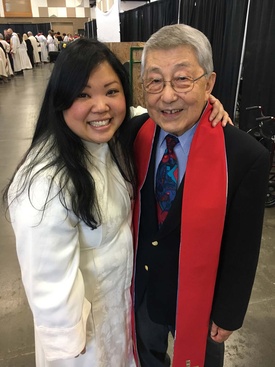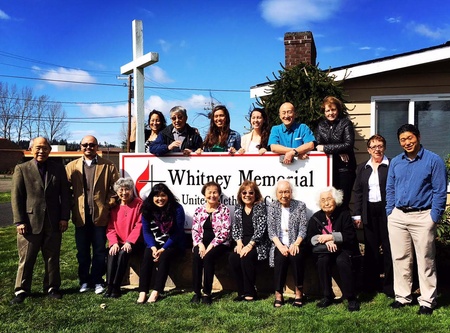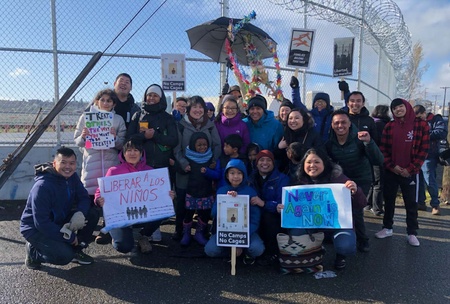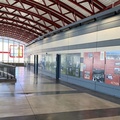For a layperson, picturing a call into ministry might look like a voice from on high, literally calling someone to their service.

It wasn’t like that for Reverend Karen Yokota Love, who is a Yonsei pastor serving the Blaine Memorial United Methodist Church in Seattle, Washington. In 2019 she was appointed the church’s first woman senior pastor in its 116-year history.
“[Going into ministry for me] was also about doing justice work,” Reverend Karen says now. “If we think about with Martin Luther King [Jr], …He was a pastor, a minister, right? And that basically was all about civil rights and social justice work and that’s also very much what I see as a role of a minister. I think when people think about pastors they think of a preacher up at the front of the church, [someone] only inside the church.... I don’t know if people think of the pastor having a voice outside of the church and being out in the streets and working with the communities and the people and that’s the kind of ministry that I strive to do.”
Reverend Karen Yokota Love grew up in San Jose’s Japantown in California, one of 3 remaining Japantowns in the mainland United States. Though her church was predominantly Japanese American, she also loved the multiethnic nature of the neighborhood and surrounding areas. “We did a lot with the Buddhist temple,” she remembers, “that’s down the street [from the United Methodist church]. We did a lot with the San Jose Japantown, like the Nikkei Matsuri, which is for the whole area, the neighborhood. Cooking Japanese food. Selling Japanese crafts. Opening up, really, the doors to the entire community. And that was like a space where I got to observe, where people that didn’t look like me, would come to learn more about the culture. And it was through a lot of those offerings that I learned about cross-cultural interactions and how we can be close to or know our identities—where we come from but then share that with other people that are also interested.” Her multigenerational church retained its strong sense of Japanese American identity and roots, even as many of its members did not speak Japanese due to pressures of assimilation.
Rev. Karen now cites her grandmother, her mother, and Reverend Mariellen Sawada Yoshino as several Japanese American women who inspired her to do work in the community. Her late grandmother Shizue Yoshina, the founder of the Asian American Curriculum Project, was a special inspiration for her to do work in the world. “She had wanted to be a doctor, but she couldn’t, because they didn’t allow women to be doctors then. She was the eldest in her family,” Rev. Karen remembers. “She had told me that I could do anything, pretty much what I wanted to do, because of what our ancestors...they laid the groundwork for us. She couldn’t do these things but then she said, you can go out and do them. That was her dying message to me.”
Despite growing up in a Japanese American church, Rev. Karen’s path did not lead straight into ministry. In high school, Rev. Mariellen Sawada Yoshino asked her if she would consider ministry, but she was not interested then. From San Jose she went to UC Berkeley where she studied journalism and eventually worked with J.K. Yamamoto at the Hokubei Mainichi. She began to learn more about the mass incarceration of Japanese Americans during World War II, which was “not something [her] family talked about, growing up,” she says. She went through several careers before coming back to the Church and her roots there.
It was through learning about Rev. Karen’s community history, going to her roots, that led her to ministry. She thought, “I’d love to do this kind of work: go out, work with people, be a voice for those that are marginalized, or work more with it, [with] the Japanese American community. And as I got older, my 20s, I spent a lot of time going back to my roots, asking questions about, like where do I come from? And why don’t I speak Japanese?” Eventually she attended graduate school at the Claremont School of Theology in Southern California, receiving her Masters in Theology there. “A lot of my call was really about wanting to serve the Japanese American community,” she says.
In 2013 Rev. Karen came to Washington State, serving two United Methodist parishes in the Seattle area: the Whitney Memorial United Methodist Church and the Milton United Methodist Church. Whitney Memorial was a historically Japanese American congregation, originally founded in Tacoma, Washington. Not long after her move she met her husband, Jesse Love.
She then moved to nearby Puyallup, serving the Puyallup United Methodist Church as associate pastor while ministering to the congregation of the former Whitney Memorial UMC, which had shrunk to 16 attending members, and closed in 2016. “I think the blessing of serving different congregations [like Milton, Puyallup, and Mason UMC in Tacoma] that were not Japanese American is that I got exposed to different ideals, different cultures... While I didn’t like some of the things that were said or believed, I also figured out a way to get to know people, to love them anyways. To have some really difficult conversations about race, about culture, about politics, about religion, about White fragility, White privilege.”

While at Puyallup, she helped organize the opening worship service at the Pacific Northwest Annual Conference of the United Methodist Church. For the first time, in 2014, the Conference was being held at the Washington State Fairgrounds in Puyallup, but few knew about the site’s connection to wartime incarceration. She decided to focus the service on the history of the fairgrounds and “Camp Harmony” as an “assembly center” during World War II.
Coming from a family of educators, she says, “If I have an opportunity to teach about incarceration, I’ll take it.”
Rev. Karen worked with area pastors Reverend Katie Klosterman and Lara Bolger to focus the service on Japanese American incarceration history and culture. Former Resident Bishop Grant Hagiya and Reverend Derek Nakano preached, and gave historical and personal contexts for incarceration. Taiko drums played. The Minidoka Swing Band played, and though some may have wondered what the connection between swing music and camp might have been, this was an opportunity to ask questions and to understand. Survivors Cho Shimizu and Suma Yagi read their writings; both are in her Blaine congregation now. And she connected the three historically Japanese American United Methodist churches in Washington State: Highland Park in Spokane, Blaine Memorial in Seattle, and Whitney Memorial in Tacoma/Puyallup. Each congregation folded a thousand cranes: the combined 3000 total served as the backdrop for the opening service.
At Blaine Memorial UMC in Seattle now, Rev. Karen has recently become the church’s first woman senior pastor. It is a church that’s known in the region as one of the mainstays of Japanese American history and community and spiritual life. How does it feel?
“So far? So far it feels great,” she says. “It feels like coming home. The food! The food alone is amazing. But to be back in the community and to serve at this capacity is pretty humbling at the same time. The church has had many female associate pastors. I think about the generations and roles and trying to define what leadership looks like… So, navigating those [kinds of] things. But overall it’s been very good. I have a good staff. The people are loving. They’re kind. They’re generous. I would say that everything at that church revolves around food – which is wonderful! Radical hospitality is their thing.”
As she looks toward the future, she has ideas and plans for serving this historically venerated congregation and community. “I’d like to see Blaine utilize their voice even more than they currently do,” she says, “because they are a platform, as a church, for the Japanese and Asian American community. I want to see how they can support not just the Asian American community but in that neighborhood – I want to see what it looks like to be fully embedded in the neighborhood. Fully integrated into the schools. We do a lot of work with the schools but there’s always more potential. To partner more with non-profits in [the surrounding] Beacon Hill / Mount Baker area. And to work with our partnership with ACRS [Asian Counseling Resource Service]. What does it look like to go deeper in that relationship, and what does it look like to support the Atlantic Street Center [a social services agency for youth and families], along with many other local non-profits in the community.”

As a pastor who considers herself an ally of LGBTQI communities, Rev. Karen also has an inner compass for navigating some of the hard conversations that the United Methodist Church is currently having about human sexuality. “I think these hard conversations are a part of our bloodline,” she says. “Because I do feel like the Japanese American people have always had to overcome what it means to have prejudice on you, right? What does it look like to take something difficult and turn it into something fruitful? I do feel like that is part of the DNA that’s been woven from my own ancestry.
“But the last thing that I want to do right now,” she concludes, “is to quit. Because I think that this is when it is getting interesting.”
* * * * *
The Blaine Memorial United Methodist Church (3001 24th Ave South, Seattle, WA) invite all in the Seattle area to their annual Sukiyaki fundraising event on March 7, 2020. Please continue to consult the site for the most current information on the event. A portion of the proceeds will go to the Rainier Valley Food Bank.
© 2020 Tamiko Nimura





